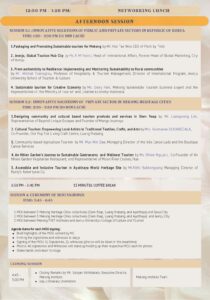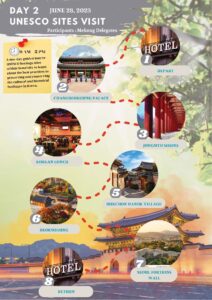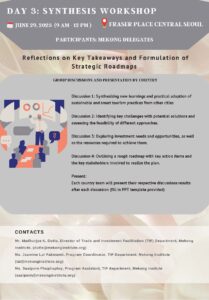
The Mekong region is a diverse and vibrant destination that attracts millions of tourists every year. In recent years, the region’s UNESCO world heritage sites have also seen a noticeable increase in the number of visitors as more and more travelers seek out cultural experiences and rich historical heritages. In addition to the hospitality and travel industries, these UNESCO heritage sites also encompass a broad range of creative industries such as performing arts and traditional music, traditional and cultural textiles and architecture designs, gastronomy, and local artisans, among others. Furthermore, the global tourism industry is currently making a strong recovery from the impact of the COVID-19 pandemic, with a projection of a 30% increase in 2023 exceeding 2019 pre-pandemic levels. These trends offer a positive impact on the local economies, providing a boost to small businesses, creating jobs, and contributing to the overall growth of the tourism industry in the Mekong region.
On the other hand, the rapid growth of the tourism industry also poses a significant challenge to the conservation of historical sites and authentic cultural heritages, as well as the environment in Mekong countries, signaling the significance of responsible and sustainable tourism practices. These heritage sites encompass unique cultural and historical treasures of the region that require careful management to mitigate the risks associated with the negative impacts of over-tourism and over-commercialization. A sustainable and smart tourism approach offers solutions to these challenges while also enhancing both the host communities’ and visitors’ experiences through technology and innovations. Sharing this aspiration, governments in the region are pursuing a more collaborative and balanced approach that takes into account the social, environmental, and economic impacts of tourism in their respective heritage destinations.
Implemented by the Mekong Institute (MI) with the financial support of the Mekong-Korea Cooperation Fund (MKCF), the project introduces smart tourism tools, techniques, and technologies with the aim of promoting and strengthening the application of sustainable and smart tourism practices.
- To strengthen the quality of hospitality and tourism services.
- To deepen collaboration between the Republic of Korea and Mekong countries through historical and cultural town twinning.
- To enhance tourism competitiveness via smart technologies
A. Korea-Mekong Hospitality Training and Mentoring
B.Facilitating Smart Tourism Development in Mekong Countries
C. Twinning of Historical/Cultural Towns Between the Republic of Korea and Mekong Countries
Technologies: Provision of tools, techniques, and technologies for smart tourism.
Information, Methods, and Outcomes: Provision of information, adaptation methods, and best practices for sustainable and environmentally friendly tourism.
Collaboration and Cooperation: Provision of information, adaptation methods, and best practices for collaboration and cooperation to enhance business connections
The three-day exchange program aims to promote collaborations and knowledge exchange on sustainable and smart heritage tourism development among the stakeholders of selected UNESCO World Heritage towns/sites through town twinning MOUs, exchange forums, and site visits. The delegates will share their respective best practices for governing and promoting sustainable and smart heritage tourism destinations, while also identifying challenges and investment opportunities in the respective locations. The program will also serve as a platform to nurture stronger relationships between the participants by fostering cross-cultural understanding in a convivial environment.
The exchange program expects around relevant 70 delegates representing both public and private sectors from Mekong Region and South Korea.

- MOU SIGNING CEREMONY
Non-binding MOUs will be signed between certain delegates on behalf of the selected heritage towns/cities. The objective of the MOUs is to promote future cooperation mechanisms that will enable collaborative activities such as information sharing, sharing of best practices for the tourism development in world heritage travel destinations, joint programs focused on the promotion of investment in sustainable tourism activities, and other mutually beneficial activities.
- MEKONG HERITAGE APP LAUNCH
The newly designed Mekong Heritage mobile app has been developed to provide information on the key attractions and tourism services and products of the 5 project locations in the Mekong region. The objective of this platform is to create a database of travelers’ service requirements, which local authorities and heritage site management could use to improve, develop, or diversify their products and services offerings for travelers. The app launch session at the exchange forum will provide an overview of its features, demonstrate its user interface, and highlight its unique features. The project team will also address the future plan and sustainability of the app such as promotion plan to attract users, system and content maintenance, and partnerships and ownership information during this session.
- EXCHANGE FORUM
There will be a knowledge exchange forum consisting of roundtable discussions and presentations. The goal is to share each other’s best practices and exchange knowledge and ideas among the participants. This agenda seeks to build stronger relationships between twinned towns and their heritage sites, provide a foundation for future knowledge exchange programs, and connect tour operators and travel agencies from Korea with delegates from Mekong countries.
- UNESCO WORLD HERITAGE SITES VISIT
There will be a one-day guided tour of heritage sites in Seoul district for the Mekong delegates. The goal is to allow the participants to explore the historical and cultural immersion as well as learn about the management and preservation practices of the twinned town.
- SYNTHESIS WORKSHOP
The workshop will involve reflecting on and analyzing the information that has been exchanged, identifying common themes and ideas, and synthesizing them into a cohesive set of recommendations or action items. The purpose is to achieve a shared understanding of what was learned and exchanged throughout the program and to identify concrete next steps that can be taken to advance the goals and objectives of the program in order to move forward and make progress.
- Mr. Madhurjya K. Dutta, Director of Trade and Investment Facilitation (TIF) Department, Mekong Institute. ([email protected])
- Ms. Jasmine Lal Fakmawii, Program Coordinator, TIF Department, Mekong Institute ([email protected])
- Ms. Sasiporn Phuphaploy, Program Assistant, TIF department, Mekong Insitute ([email protected])





